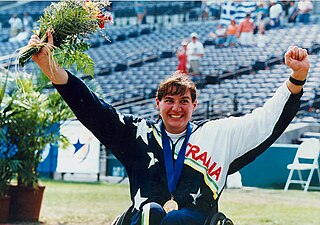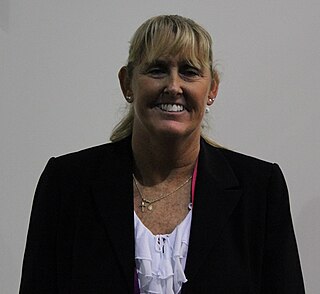
Alix Louise Sauvage, OAM is an Australian paralympic wheelchair racer and leading coach.

Stephen Robert Eaton, OAM is an Australian athlete with cerebral palsy from Toowoomba, Queensland who competes at the national and international level in discus throwing and shot put at events such as the Paralympic Games and IPC Athletics World Championships.
Stephen James Miller MBE is a British athlete who competes in the fields of Paralympic club and discus throwing. He has won three gold, one silver, and one bronze medal in the F32/51 club throw at the Paralympics. In Paralympic F32/51 discus he won one bronze medal.

Siobhan Bethany Paton, OAM is an Australian Paralympic swimmer who was born in Sydney. Paton has had an intellectual disability from birth which was a consequence a lack of oxygen. Paton decided to become a swimmer after finding out she has a connective tissue disorder and that swimming would assist in the strengthening of her joints. Siobhan initially began competing with non-disabled athletes and only in 1997 did she compete in a competition for athletes with disabilities, where she won seven gold medals and one silver medal. As of 2004, she holds thirteen world records in her disability class of S14.

Trischa Zorn is an American Paralympic swimmer. Blind from birth, she competed in Paralympic swimming. She is the most successful athlete in the history of the Paralympic Games, having won 55 medals, and was inducted into the Paralympic Hall of Fame in 2012. She took the Paralympic Oath for athletes at the 1996 Summer Paralympics in Atlanta.

Australia has participated officially in every Paralympic Games since its inauguration in 1960 except for the 1976 Winter Paralympics.
Paralympics Australia (PA) previously called the Australian Paralympic Committee (APC) (1998–2019) is the National Paralympic Committee in Australia for the Paralympic Games movement. It oversees the preparation and management of Australian teams that participate at the Summer Paralympics and the Winter Paralympics.

Australia competed at the 2012 Summer Paralympics Games in London, United Kingdom, from 29 August to 9 September 2012. The London Games were the biggest Games with 164 nations participating, 19 more than in the 2008 Beijing Paralympic. Australia has participated at every Summer Paralympic Games and hosted the 2000 Sydney Games. As such, the 2000 Sydney Games, regarded as one of the more successful Games, became a point-of-reference and an inspiration in the development of the 2012 London Games.

Australia competed at the 2004 Summer Paralympics in Athens, Greece. It was Australia's 12th year of participation at the Paralympics. The team included 151 athletes. Australian competitors won 101 medals to finish fifth in the gold medal table and second on the total medal table. Australia competed in 12 sports and won medals in 8 sports. The Chef de Mission was Paul Bird. The Australian team was smaller than the Sydney Games due to a strict selection policy related to the athletes' potential to win a medal and the International Paralympic Committee's decision to remove events for athletes with an intellectual disability from the Games due to issues of cheating at the Sydney Games. This was due to a cheating scandal with the Spanish intellectually disabled basketball team in the 2000 Summer Paralympics where it was later discovered that only two players actually had intellectual disabilities. The IPC decision resulted in leading Australian athletes such as Siobhan Paton and Lisa Llorens not being able to defend their Paralympic titles. The 2000 summer paralympic games hosted in Sydney Australia proved to be a milestone for the Australian team as they finished first on the medal tally for the first time in history. In comparing Australia's 2000 Paralympic performance and their 2004 performance, it is suggested that having a home advantage might affect performance.

John Desmond Eden is a leg-amputee athlete and Australian and New Zealand Paralympian.

Hamish Anderson MacDonald, OAM is an Australian Paralympic athlete. He was born in Melbourne and lives in Canberra. He has cerebral palsy. His achievements and advocacy have made him one of Australia's most respected Paralympians.

Kenya competed at the 2004 Summer Paralympics in Athens, Greece. Their delegation included 16 athletes, 8 men and 8 women, who won 3 golds, 1 silver and 3 bronze medals. Institutional problems inside Kenyan elite disability sport impact the country's performance at the Paralympic Games.

Kenya competed at the 1996 Summer Paralympics. The country sent a 17 strong athlete delegation to Atlanta, United States.

Kenya competed at the 2012 Summer Paralympics in London, United Kingdom from August 29 to September 9, 2012, where they were represented by thirteen athletes who won six medals at these games, two gold, two silver and two bronze. All the country's Paralympians competed in athletics. Kenya had originally qualified a larger team, and in more sports like powerlifting and rowing.

Nigeria competed at the 2012 Summer Paralympics in London, United Kingdom from 29 August – 9 September 2012. Nigerian Paralympians combined won more medals than their Olympic counterparts in London, winning 6 golds, 5 silvers and 2 bronze medals.

Brayden Duane Davidson is an Australian track and field para-athlete who competes mainly in the T36 classification events. He won a bronze medal at the 2015 IPC Athletics World Championships. At the 2016 Rio Paralympics, he won the gold medal in the Men's Long Jump T36.

The United Arab Emirates sent athletes to the 2016 Summer Paralympics in Rio de Janeiro, Brazil, from 7 September to 18 September 2016.

Namibia competed at the 2016 Summer Paralympics in Rio de Janeiro, Brazil, from 7 September to 18 September 2016.

Kenya competed at the 2016 Summer Paralympics in Rio de Janeiro, Brazil, from 7 September to 18 September 2016.

Kenya competed at the 1992 Summer Paralympics in Barcelona, Spain. 15 competitors from Kenya won 2 medals, 1 gold and 1 bronze to finish 41st in the medal table. 13-year-old Mary Nakhumica made her Paralympic debut, winning Kenya's only gold in the women's javelin throw THW7 event.












